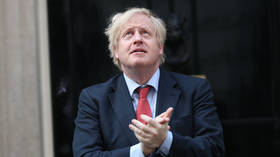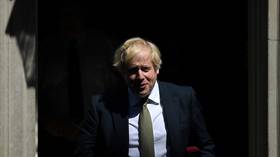End the lockdown, cut the green crap… Here’s five things the UK government should do now to get us out of the mess they created

The economic Armageddon that’s been caused by our botched response to Covid-19 needs quick and decisive action to combat it. Here’s my blueprint for Boris Johnson (and any other Western leader who needs it).
Dear Boris,
I trust you are well, especially after that nasty bout of Covid-19. And I hope baby Wilfred isn’t keeping you up at night. However, the state of the UK’s economy should be giving you a touch of insomnia.
After all, it shrank by two percent in the first quarter of this year, and a whopping 5.8 percent in March compared to the month before. That’s the biggest one-month drop on record. Given that we were only in lockdown from March 23, the figures for April – and indeed, the rest of the year – are bound to be awful.
If the pandemic was an emergency, the state of the economy is even more worrying. I won’t go on about your actions having caused it – except to say that THEY DID – as we are where we are, sadly. So, in a spirit of helpfulness, here are five things that I think you should do to turn things around.
1. End the lockdown as soon as possible
Your announcement of changes to the lockdown was welcome. At least we have some sense of how things might move forward. But there needs to be much more urgency. You have said that anyone who can’t work from home should go back to work if they can do so safely. That should include all shops now, not just those that are ‘essential’.
Public transport should get back to full service as soon as possible. It’s time to consider opening up more fully for those age groups that are least at risk, too. Although there have been over 33,000 recorded deaths related to Covid-19 – it may well be many more – hardly any have been people under the age of 40. In a recent set of figures, for the week ending May 1, Covid-19 deaths made up just 10 percent of all deaths among the under-40s – a group for whom mortality is already very low.
So let’s open up everything for people in that age group who want to work or use services, including pubs, restaurants and hairdressers. Let’s get them back to normal right now. It will give businesses a chance to get up and running again, and it will help to increase the number of people who have had the disease in a fairly safe manner.
We should expand the age range every couple of weeks until everyone is able to work and socialise as normal, unless they have a specific underlying condition that means they should avoid other people for a bit longer. The guidance for over-70s that they should avoid social contact where possible should remain in place, but it shouldn’t be mandatory.
2. Get real about the state of the economy
Things are looking bad right now. But what’s worse is not facing up to the truth: that the UK economy was in a poor state before this crisis hit – as, indeed, were economies across the Western world. GDP growth was weak. Productivity improvements have been very slow for decades. Production has been falling in the UK for a year. Low unemployment has masked the poor quality and low wages of many of the jobs that have been created in recent years, many of which disappeared in the blink of an eye when the lockdown happened.
Failing to recognise this fact leads to policies that focus on getting back to normal, on muddling through rather than being decisive about the future.
One very important problem is the accumulation of ‘zombie’ companies – ones that have enough cash to just about survive, but not enough to invest in raising productivity. These drag the rest of the economy back. At some point, these companies need to find a way to get out of their rut or close down. But successive governments have done little to clear away this dead wood.
Most importantly right now, propping up un-viable businesses will cost enormous sums with no long-term benefit. The Chancellor of the Exchequer, Rishi Sunak, has announced that the furloughing scheme to protect jobs will be extended until October. While this is welcome for profitable businesses that would otherwise lay off staff, it keeps millions of workers hanging around waiting for the scheme to end – at which point many less viable companies will close down. Other companies will use the opportunity to cut costs by sacking staff. It is better for workers to move on to look for new jobs as the economy recovers, even if there is short-term pain.
Also on rt.com Covid-19 & the strange death of English liberty: We were once freebooting pirates, now we churn out fear-stricken weaklings3. Start acting strategically
Does the government have a plan for how the economy should look? While every few years there is another attempt at pulling together an industrial strategy – the latest one was in 2017 – they always end up being trivial and banal, if they are implemented at all. One obvious idea would be to boost research and development (R&D) spending massively. The UK is currently way behind other countries.
We should look to improve our infrastructure. One thing the lockdown has reminded us of is the need for reliable, fast internet connections across the country. That might mean digging up a lot of roads and pavements to put down fibre optic cables, but it would be worth it in the long run. We should expand 5G mobile internet rapidly, but the UK government is more focused on getting the current, comparatively slow 4G to unconnected areas.
While High Speed 2 (HS2), a new rail line connecting London to the Midlands and the north, is expensive and controversial, building higher speed lines across the country would help overcome the poor connections between many major cities. However, there would be far bigger gains from building and expanding roads – something the UK has a poor record on.
Above all, we need housing. Lots of it. The lack of housing in comparison with demand means prices, particularly around London, are ludicrously high and a drag on other sectors. That means grasping the nettle and reducing the size of anti-sprawl green belts around cities. They’re throttling development, and in many cases, they aren’t very green at all.
4. Conquer the fear factor
Fear is hurting the UK in two different ways. First, and most immediately, there is the fear of returning to work and getting businesses and public services running normally again.
Second, there is a fear of spending, both by consumers and businesses. One sign is that credit card debt fell faster in March than at any time since 2013. In general, reducing debt is a good thing, but not if it is a sign of hunkering down. That could stall the economy. Businesses will be putting investment on hold, too, and it wasn’t exactly at stellar levels to start with.
The government needs to recognise this and start changing its messaging. The virus is dangerous to some people, but for most the risk is low. The economic depression is a danger to all. The lockdown is ending, so we need to start living life as normally as possible. Unfortunately, the original message was so strident to ensure we all abided by the lockdown rules that it will be hard to back down from.
5. Cut the ‘green crap’
In 2013, David Cameron, your erstwhile Eton chum and former prime minister, allegedly told his aides to “get rid of all the green crap” from energy bills to drive prices down. Cameron was right. Brits already pay over £100 per year for various green measures, and that price will rise to £200 per year by 2030.
In a whole host of ways, environmental policies foist additional costs onto society. While we usually only think about households, many energy-intensive businesses struggle under the weight of these green subsidies. Most importantly, sustainability is the watchword today, rather than efficiency. At a time when financial resources are going to be thin on the ground, wasting money on green policies is holding society back from recovery.
Even worse, many eco-friendly commentators are actually delighted with the lockdown. They see it as proof we can make do with less travel and lower consumption. This would be a disaster for our society – we would all be poorer and stay poorer. Given that the lockdown has not actually cut greenhouse gas emissions that much – one estimate suggests they are down by 36 percent – the consequences of ‘net zero’ emissions are obvious: standstill.
This may not make you very popular at home with your green campaigner fiancee, Carrie Symonds. But if you make any concessions to green thinking, we will end up with a green-tinged depression, not a recovery.
I know you have many hundreds of economic advisers over at the Treasury – feel free to share this with the dishy Rishi Sunak, of course! – but I do hope you’ll find this memo of some help. After all, depressions do have to have a depressing outcome for governments and occupiers of No. 10 Downing Street, as I’m sure you are only too aware.
Best, Rob.
Like this story? Share it with a friend!
The statements, views and opinions expressed in this column are solely those of the author and do not necessarily represent those of RT.















